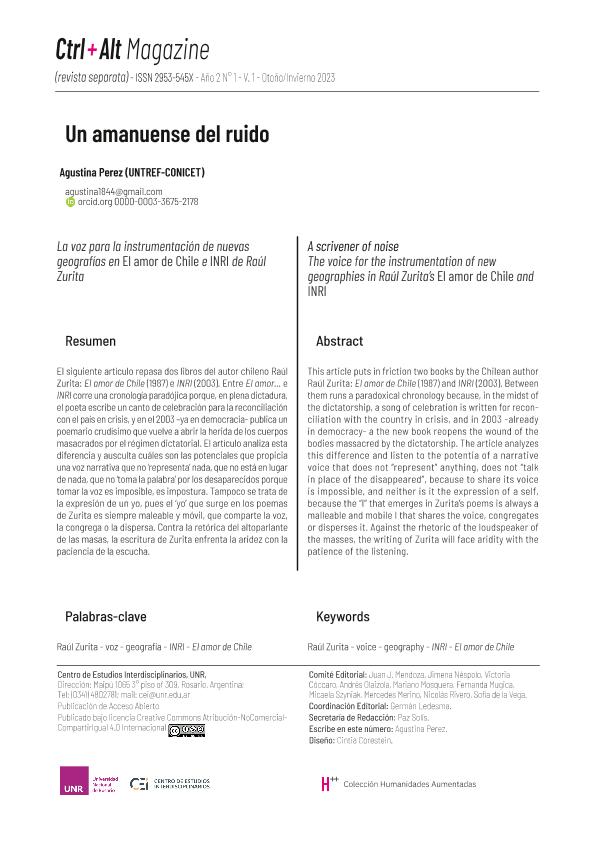Mostrar el registro sencillo del ítem
dc.contributor.author
Pérez, Agustina Jazmín

dc.date.available
2023-12-07T11:01:40Z
dc.date.issued
2023-06
dc.identifier.citation
Pérez, Agustina Jazmín; Un amanuense del ruido: La voz para la instrumentación de nuevas geografías en El amor de Chile e INRI de Raúl Zurita; Universidad Nacional de Rosario. Centro de Estudios Interdisciplinarios; Ctrl + Alt Magazine; 1; 1; 6-2023; 1-8
dc.identifier.issn
2953-545X
dc.identifier.uri
http://hdl.handle.net/11336/219603
dc.description.abstract
El siguiente artículo repasa dos libros del autor chileno Raúl Zurita: El amor de Chile (1987) e INRI (2003). Entre El amor… e INRI corre una cronología paradójica porque, en plena dictadura, el poeta escribe un canto de celebración para la reconciliación con el país en crisis, y en el 2003 –ya en democracia- publica un poemario crudísimo que vuelve a abrir la herida de los cuerpos masacrados por el régimen dictatorial. El artículo analiza esta diferencia y ausculta cuáles son las potenciales que propicia una voz narrativa que no ‘representa’ nada, que no está en lugar de nada, que no ‘toma la palabra’ por los desaparecidos porque tomar la voz es imposible, es impostura. Tampoco se trata de la expresión de un yo, pues el ‘yo’ que surge en los poemas de Zurita es siempre maleable y móvil, que comparte la voz, la congrega o la dispersa. Contra la retórica del altoparlante de las masas, la escritura de Zurita enfrenta la aridez con la paciencia de la escucha.
dc.description.abstract
This article puts in friction two books by the Chilean author Raúl Zurita: El amor de Chile (1987) and INRI (2003). Between them runs a paradoxical chronology because, in the midst of the dictatorship, a song of celebration is written for reconciliation with the country in crisis, and in 2003 -already in democracy- a the new book reopens the wound of the bodies massacred by the dictatorship. The article analyzes this difference and listen to the potentia of a narrative voice that does not “represent” anything, does not “talk in place of the disappeared”, because to share its voice is impossible, and neither is it the expression of a self, because the “I” that emerges in Zurita’s poems is always a malleable and mobile I that shares the voice, congregates or disperses it. Against the rhetoric of the loudspeaker of the masses, the writing of Zurita will face aridity with the patience of the listening.
dc.format
application/pdf
dc.language.iso
spa
dc.publisher
Universidad Nacional de Rosario. Centro de Estudios Interdisciplinarios
dc.rights
info:eu-repo/semantics/openAccess
dc.rights.uri
https://creativecommons.org/licenses/by-nc-sa/2.5/ar/
dc.subject
RAÚL ZURITA
dc.subject
ESCRITURA
dc.subject
VOZ
dc.subject
DICTADURA
dc.subject.classification
Literaturas Específicas

dc.subject.classification
Lengua y Literatura

dc.subject.classification
HUMANIDADES

dc.title
Un amanuense del ruido: La voz para la instrumentación de nuevas geografías en El amor de Chile e INRI de Raúl Zurita
dc.title
A scrivener of noise: The voice for the instrumentation of new geographies in Raúl Zurita’s El amor de Chile and INRI
dc.type
info:eu-repo/semantics/article
dc.type
info:ar-repo/semantics/artículo
dc.type
info:eu-repo/semantics/publishedVersion
dc.date.updated
2023-12-05T15:00:03Z
dc.journal.volume
1
dc.journal.number
1
dc.journal.pagination
1-8
dc.journal.pais
Argentina

dc.journal.ciudad
Rosario
dc.description.fil
Fil: Pérez, Agustina Jazmín. Universidad Nacional de Tres de Febrero; Argentina. Consejo Nacional de Investigaciones Científicas y Técnicas; Argentina
dc.journal.title
Ctrl + Alt Magazine
dc.relation.alternativeid
info:eu-repo/semantics/altIdentifier/url/http://hdl.handle.net/2133/25854
Archivos asociados
